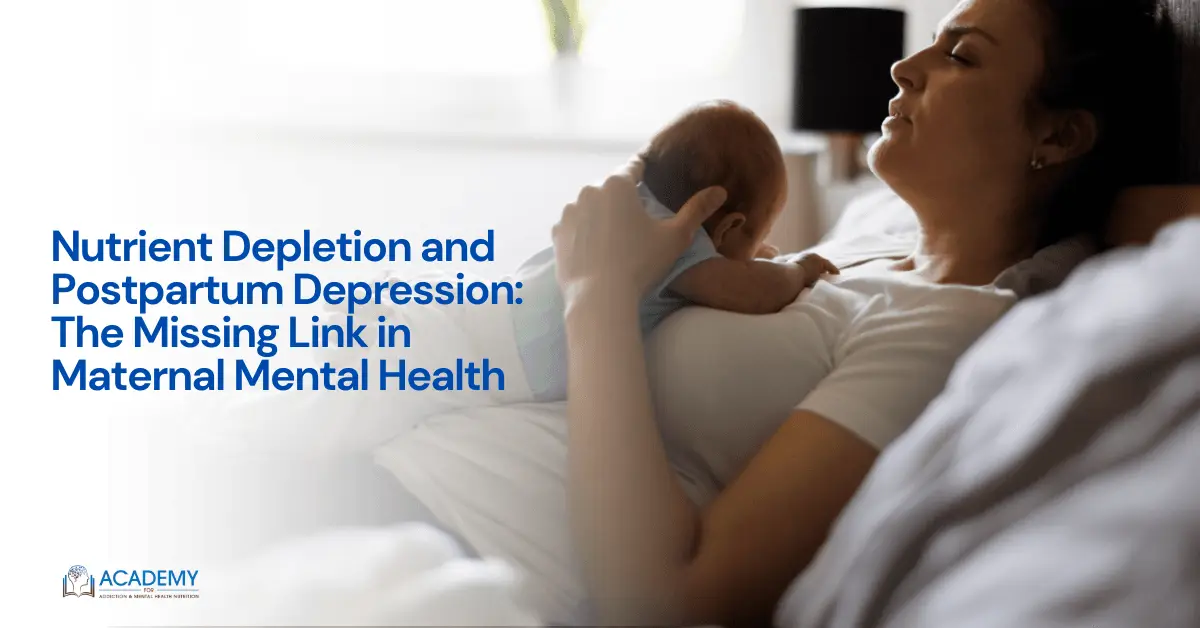At the Academy for Addiction and Mental Health Nutrition, we provide cutting-edge, in-depth, online, and live education and consultation services. Our goal is to train mental health and addiction treatment professionals and volunteers to identify and address the biochemical aspects of client symptoms through nutrient interventions.
This blog post will explain our three tiers of nutritional intervention and how they can improve client outcomes within the framework of nutritional psychiatry.
Three Tiers of Nutritional Intervention
Psycho-Education
The first tier, Psycho-Education, is the easiest to implement. It involves educating staff and clients about the connection between food, mood, and cravings. By understanding the symptoms of depleted neurotransmitters and how to relieve them through diet and targeted supplements, clients can create more robust recovery and relapse prevention plans.
- Food/Mood/Craving Connection: Educate your staff and clients on how different foods can impact their mood and cravings. For example, consuming protein-rich foods can support neurotransmitter function, while sugary treats can disrupt it.
- Symptoms and Relief: Discuss the symptoms of depleted neurotransmitters, such as low energy, anxiety, and depression, and how these can be alleviated through proper nutrition and supplements.
- Biochemical Causes of Relapse: Explain the common biochemical causes of relapse and emotional dysregulation. This understanding helps clients recognize their biochemical triggers and manage them effectively.
By feeding their brains properly, clients can restore neurotransmitter function without relying solely on psychotropic medication. This approach reduces shame and guilt while restoring hope and motivation for change. This tier lays the groundwork for nutritional psychiatry, emphasizing the importance of diet in mental health.
In-Office Assessments and Recommendations
The second tier involves in-office assessments and recommendations. Simple assessment tools recommend specific and individualized dietary changes and targeted nutrient suggestions. These recommendations empower clients to support their brain health and restore neurotransmitter function without relying solely on medication.
- Assessment Tools: Assess clients’ dietary habits and nutritional needs. These tools help tailor recommendations to each client’s unique biochemical makeup.
- Dietary Changes and Nutrients: To support brain health, recommend specific dietary changes and targeted nutrients. For instance, increasing intake of omega-3 fatty acids can improve mood and cognitive function.
- Self-Care Behavioral Changes: Encourage clients to adopt self-care practices that they and their families can use for the rest of their lives. These practices include regular exercise, stress management techniques, and healthy eating habits.
Since dietary changes and supplements can improve symptoms within 20 minutes, clients often experience immediate benefits. This quick improvement boosts hope and motivation, empowering clients to take greater responsibility for their well-being and families. This tier of nutritional psychiatry provides practical, actionable steps for improving mental health through nutrition.
Laboratory Testing and Referrals
The final tier involves laboratory testing and referrals. Specially trained staff or consultants use assessment tools to identify possible underlying physical disorders that may contribute to emotional and physical distress. These disorders can deplete neurotransmitters and drive the need to self-medicate for relief.
- Identify Physical Disorders: Use assessment tools to identify physical issues affecting clients’ mental health. These could include thyroid imbalances, nutrient deficiencies, or other medical conditions.
- Request Labs: Request specific lab tests to confirm imbalances. These tests help provide a clear picture of the client’s health status.
- Diagnosis and Treatment: Functional medical professionals on staff can diagnose and treat identified disorders. Alternatively, refer clients to appropriate providers for further care.
Addressing these underlying physical issues can be a game-changer for many clients, significantly improving their recovery outcomes. This tier of nutritional psychiatry ensures that all aspects of a client’s health are considered and treated appropriately.
By integrating these three tiers of nutritional intervention into your practices and programs, you provide a rare and essential service to your clients. This approach, which focuses on feeding the brain, offers a solid foundation for any recovery journey. It also sets you apart as an innovative, cutting-edge provider, creating a necessary paradigm shift in nutritional psychiatry.
For a more comprehensive strategy and roadmap for integrating nutritional intervention into your practice or program, check out our eBook, Expanding Your Horizon: Integrating Nutritional Intervention into Mental Health & Addiction Practice & Treatment. This resource will guide you through the process and help you effectively implement these interventions.








